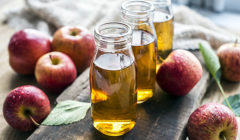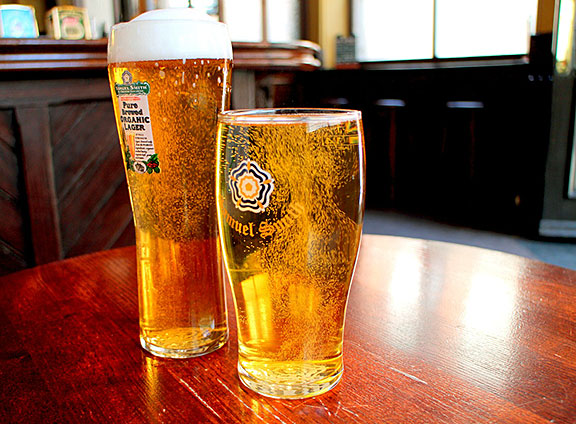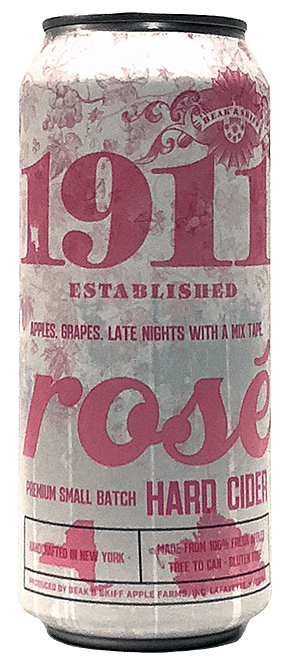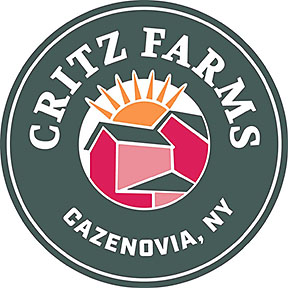Apples, they’re not just for eating!

Let’s take a pause from craft beer and instead turn our attention this month to craft hard ciders; After all, apple season is upon us! Seemingly, we all have heard of Woodchuck or Angry Orchard, mass-produced hard ciders found in grocery stores all over the US, but there are plenty of other ciders to choose from, in all varieties as well. Lucky for us, we live in the heart of apple country, with a number of lovely local options to choose from this autumn. Before we get too ahead of ourselves, let’s take a look at how hard cider is created!
While any type of apples can be used, most hard ciders are ranked from sweet to dry, just like wine. Therefore, different varieties of apples will yield different results along the scale. Apples have acids and tannins, just like grapes, which also contribute to the specific end product that is created. Apples are harvested when ripe and pressed for the juices. The fresh juice is then collected and placed into tanks, casks, vats, barrels, etc., where simple sugars in the apple juice are converted into ethanol by yeast; these yeast strains can be wild, but most are cultivated strains that are added by the manufacturers. Temperatures at which ciders are created vary anywhere from 40 to 60 degrees Fahrenheit. Eventually, the liquid is strained, yeast is filtered out, and placed into a new container. Fermentation continues and carbon dioxide is created with the remaining sugars, a.k.a. carbonation. As well, other flavors, juices and additives, can be added during the process of fermentation as well. It’s not unusual to find hopped ciders, ciders with additions of honey, cranberries, grapes and even maple syrup! Fermentation can take anywhere from 3 months to 3 years! When it comes time to bottle, fermentation can still continue in the individual containers. As well, all ciders need to undergo the process of pasteurization to kill any harmful bacteria. Once the process is completed, it’s ready for consumption!
Everyone who isn’t living under a rock has heard of Johnny Appleseed, (or John Chapman, which was his real name), but did you know that those famous apple trees of the 1800s weren’t planted for the intention of eating, but instead the varieties he planted were intended to create hard cider? You see, water wasn’t exactly the drink of choice back in the day, as it wasn’t always safe to drink, especially as settlers traversed the frontier to settle lands west of Pennsylvania. Cider was a much safer beverage, and deemed appropriate for the whole family to consume.
Today, craft hard cider is growing as much in popularity as craft beer, and with so many different ingenious concoctions to try! As well, ciders are naturally gluten-free, and therefore people with specific allergies or food sensitivities are able to imbibe right alongside their beer-swigging friends.
There are a multitude of cideries and distilleries in Upstate New York where you can try different varieties of craft hard ciders, including:
Beak and Skiff Apple Hill Campus & 1911 Tasting Room, Lafayette, NY
Critz Farms Brewing & Cider Company, Cazenovia, NY
Fly Creek Cider Mill & Orchard, Cooperstown, NY
Nine Pin Ciderworks, Albany, NY
Black Bear Winery, Chenango Forks, NY
Finger Lakes Cider House at Good Life Farm, Interlaken, NY
If you’re not sure where to start with hard ciders, these are three of my favorites!
 1911 Rosé Hard Cider
1911 Rosé Hard Cider
This is a semi-sweet hard cider brewed with grapes. Pink in color and bubbly, it’s a lovely hard cider to drink at any time of the year! It is slightly floral, yet crisp, it’s one of my favorites out of the entire line of specialty ciders that the Beak & Skiff’s 1911 brand produces. Bonus, you can usually find this scattered at local grocery stores, restaurants and even at the Amphitheatre on Onondaga Lake.
Nine Pin 26er #2 Crimson Crab
I had this when I visited Albany earlier this year and it was one of the best ciders I’ve ever had. Uniquely, this cider is created with crabapples. Upon first sip, it tastes very similar to their signature cider but on the back-end, it’s super tart and almost floral in nature. So different, but SO good! You’ll likely have to make a trip to their tasting room to find this one! Otherwise, other varieties of Nine Pin ciders can be found throughout CNY both on tap and in cans.
 Critz Farms Harvest Moon Heritage Hops
Critz Farms Harvest Moon Heritage Hops
For everyone who’s a beer lover, this one’s for you. With hops grown exclusively in Madison County, this cider is quite dry with subtle hop aromas and flavors, so even if you’re not a beer drinker, it’s still worth your while to at least try it! This particular hard cider has been brewed for a number of years and has been awarded competition silver and bronze medals in both 2014 and 2016.
Cheers!!










